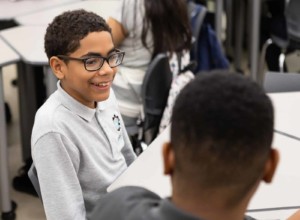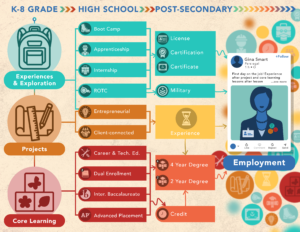Our Schools Must Adjust to a COVID-19 World

By: Ulrich Boser
The coronavirus will be here for a while. Indeed, it might be years until a vaccine is developed, and given that reality, the nation’s education system needs far better plans than doubling down on traditional classes delivered via Zoom.
Across America, educators should do more to use tech to support longer-term projects that will better engage students, particularly in more forms of community and project-based learning. In other words, educators should grade students on what they actually accomplish and can do.
More broadly, educators should think about ways to make content easier to learn and practice from home. This push for projects also gives educators an opportunity to make the subject matter far more relevant to students’ lives and future.
To show their skills in science or social studies, students could tackle a project such as, say, studying traffic patterns at intersections or sampling lakes for pollution and then present their data and proposed solutions to their local governments for a grade. Efforts at Lucas Education Research show that such project-based forms of learning can help students pass rigorous AP exams.
Science is similar. Science labs are often where students get practice at thinking like physicists, chemists, and biologists. To help students gain access to more science labs, engineers have started to build open, responsive remote laboratories. These sorts of efforts should be scaled.
Art is not that different: A student could take an hour a week to contribute individually to a classwide art project intended to beautify a park. And, finally, take gym class: Why not have students record all their steps using a mobile app over the course of a day? It’s a far better measure of exercise than sitting in front of a computer.
Other projects might underscore work and online public service opportunities. The Smithsonian Digital Volunteer asks for help, for example, in categorizing historical documents. And given that so many offices have moved online, districts should offer academic credit for internships. I’ve started an internship of sorts in my own house. Instead of camp this summer, I’ve been paying my older child a few cents per word to write articles for our organization for an online course. It helps my daughter keep her writing skills sharp—and gain more real-world experience.
This emphasis on project-based learning should also be an effort to make subject matter far more relevant to students’ lives and future. Math teachers, for example, should focus far more on data science instead of outdated subjects like trigonometry. A rich understanding of data mapping and analysis is key to most 21st century professions, as experts like Jo Boaler and Steven Levitt have argued. To teach data science, teachers could have students work on data projects or apps that encompass their individual interests. Like a citywide reading effort, such programs would not be hard to roll out.
To foster more meaningful project-based teamwork, states and other organizations can also set up online competitions, where groups of students could solve a complex problem. Organizations such as Kaggle have been staging competitions in data science for adults for years. Similar to Math Olympiads, the organizers of such competitions typically share a large data set and outline a specific data science challenge. Teams then compete to develop the best solution. The contests could be both small scale (within a classroom or school) and large scale (across multiple districts or states)
Virtual debates can provide a similar role in social studies and civics courses. In the debates, students will research an argument, support their ideas with evidence, and resent their views via a short video clip filmed on their phone—are also more active ways of showing what a student has learned.
Some of these ideas would help address the equity gaps that have persisted in American education for generations and push more critical thinking in schools. Real-world competitive programs such as urban debate clubs have raised outcomes for African-American males, while community computer science programs like “Hour of Code” have shown success sparking interest in computer science among girls.
To be sure, project-based learning needs to be done thoughtfully. If students don’t have a conceptual understanding of a topic, they might not gain enough from the effort or just feel lost. In this regard, teachers should make sure that students get more direct forms of instruction in which they gain the basic skills before they launch a new type of project-based learning.
To scale better approaches to learning in a pandemic, I’ve been working with Schmidt Futures and Citadel Founder and CEO Ken Griffin to launch a tools competition that will award up to $2 million in prizes. The project invites innovators to submit solutions to help address learning loss while advancing the field of learning engineering.
Submissions with a new concept can earn up to $25,000. Solutions with demonstrated infrastructure and a robust user base may receive up to $250,000. While the competition isn’t focused on project-based learning specifically, it does support efforts to use technology and other tools to address learning loss.
No doubt, it will take time for both parents and educators to come to grips with this new educational reality and the need for more project-based learning. Some have argued that efforts to inject innovations into the nation’s school systems are really just an attempt to privatize education and turn schooling into a business. Others have pointed out educators are under enough stress already; they shouldn’t have to come up with new ways of teaching too. These concerns are well-founded. Zoom fatigue is real, and the public should remain at the heart of public education.
But in the end, education leaders need to face up to the fact that school will not be reopening in any traditional way this fall, and they must create a new, more flexible education system that works for all students.
For more, see:
- Redefining Pre-Service Learning in the Virtual Age
- Improving Financial Aid and College Enrollment Outcomes for First-Generation Students
- Is the End of Standards-Based Teaching Near?
Ulrich Boser is the CEO of the Learning Agency and a senior fellow at the Center for American Progress.







0 Comments
Leave a Comment
Your email address will not be published. All fields are required.